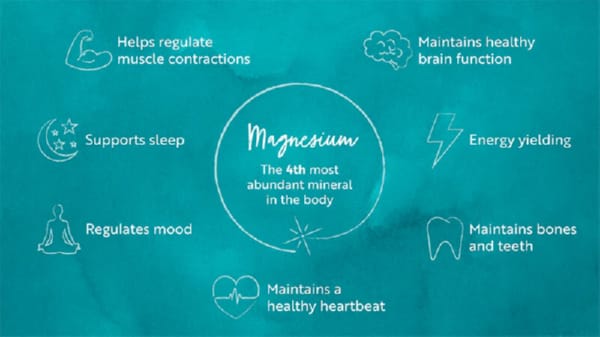



7 Signs of Magnesium Deficiency You Shouldn't Ignore
Feeling tired, anxious, or not sleeping well? You might attribute these feelings to a busy life, but the culprit could be a hidden nutrient gap. How do I know if I have a magnesium deficiency? It often whispers before it shouts. This guide uncovers 7 common signs that the 'Master Mineral' might be missing from your diet and explains how to fix it. If you're looking for scientifically formulated solutions to restore your balance, discover iMissoft's high-absorption minerals.

Why is Magnesium So Important for Your Health?
Before diving into the symptoms, it's crucial to understand why magnesium is so essential. This mighty mineral is a key player in over 300 biochemical reactions in your body, influencing everything from energy production to DNA repair.

The "Spark of Life": A Cofactor in Over 300 Bodily Reactions
Think of magnesium as the "spark plug" for your cells. It helps convert food into energy, creates new proteins, and supports the function of your nervous system. Without enough of it, your body's fundamental processes can start to slow down.
Regulating Your Nerves, Muscles, and Blood Sugar
Magnesium plays a critical role in nerve transmission, muscle contraction, and maintaining a normal heart rhythm. It also helps regulate blood sugar levels and supports a healthy immune system. Its widespread influence is why even a mild deficiency can have noticeable effects on your daily well-being.
Top 7 Signs You Might Have a Magnesium Deficiency
What are the symptoms of low magnesium? Because it's involved in so many processes, the signs can be varied and are often mistaken for other issues. Here are seven of the most common red flags.
1. Muscle Twitches, Tremors, and Cramps
Unexplained and annoying muscle twitches, especially around the eyes, or painful muscle cramps in your legs are classic early signs of magnesium deficiency. Magnesium helps regulate muscle function by acting as a natural calcium blocker, helping muscle cells relax after contracting.
2. Fatigue and Chronic Tiredness
Feeling drained no matter how much you rest? Fatigue is one of the most common, yet vaguest, symptoms. Magnesium is essential for energy production at the cellular level. Low levels mean your body struggles to create the energy you need to get through the day.
3. Poor Sleep Quality and Insomnia
Magnesium is crucial for calming the nervous system and preparing your body for rest. It helps regulate neurotransmitters that promote sleep, like GABA. If you struggle with insomnia or wake up frequently, it might be a sign you need more magnesium for sleep.
4. Increased Anxiety, Stress, and Irritability
Magnesium has a powerful calming effect on the nervous system. When levels are low, you might feel more on edge, irritable, or anxious. It helps regulate your body's stress-response system, making it a key mineral for stress relief.
5. Frequent Headaches or Migraines
Research has linked low magnesium levels to an increased risk of headaches and migraines. It is believed to help by reducing the constriction of blood vessels in the brain and balancing neurotransmitters.
6. Irregular Heartbeat or Palpitations
Feeling your heart skip a beat can be unsettling. These heart palpitations can be a sign of magnesium deficiency, as the mineral is critical for maintaining a steady, normal heart rhythm.
7. Loss of Appetite and Nausea
While less specific, a persistent loss of appetite or feelings of nausea can be early indicators of a magnesium deficiency. It's your body's subtle way of signaling that something is out of balance.
How to Restore Your Magnesium Levels Naturally
The good news is that you can take active steps to increase your magnesium levels. How can I increase my magnesium levels? The journey starts with your plate.
Top Magnesium-Rich Foods to Add to Your Diet
You can boost your intake by incorporating more magnesium-rich foods into your daily meals. Excellent sources include:

- Spinach and other leafy greens
- Almonds, cashews, and pumpkin seeds
- Avocado
- Dark chocolate (in moderation!)
- Legumes like black beans and chickpeas
- Whole grains
Lifestyle Factors That Can Deplete Magnesium
Certain lifestyle factors can deplete your body's magnesium stores. These include chronic stress, excessive alcohol consumption, and taking certain medications. Being mindful of these can help preserve your levels.
Choosing the Best Magnesium Supplement for Sleep and Anxiety
While a food-first approach is ideal, many people still struggle to get enough magnesium through diet alone. In this case, a high-quality supplement can be a game-changer, but the form you choose matters immensely.
Not All Magnesium is Created Equal: The Bioavailability Problem
Many common, inexpensive magnesium supplements (like magnesium oxide) have very poor magnesium bioavailability. This means your body can't absorb them well, leading to minimal benefits and often causing digestive upset.

Why Magnesium Bisglycinate is a Superior Choice for Absorption
Which magnesium is best for anxiety and sleep? Magnesium Bisglycinate is a form where magnesium is bound to the amino acid glycine. This "chelation" process protects the mineral, allowing it to be absorbed far more effectively. Glycine itself has a calming effect, making this form a double-win for relaxation and sleep. These advanced chelated minerals are designed for maximum impact.
Gentle on the Stomach, Powerful for the Mind
Because of its superior absorption, magnesium bisglycinate is famously gentle on the digestive system, avoiding the laxative effect common with other forms. This allows you to get the mental and physical benefits without the discomfort. For those seeking the best, iMissoft offers premium, highly absorbable magnesium supplements.
Take Control of Your Well-being by Addressing Magnesium Deficiency
Don't let a simple mineral deficiency hold you back from feeling your best. By recognizing the signs and taking proactive steps, you can restore your body's balance and reclaim your energy, calm, and vitality.
Key Takeaways: Listen to Your Body's Signals
- Pay attention to subtle signs like muscle twitches, fatigue, and poor sleep.
- Prioritize magnesium-rich foods in your diet.
- When choosing a supplement, opt for a highly bioavailable form like Magnesium Bisglycinate for the best results.
A Call to Action: Restore Your 'Master Mineral' Today
Ready to finally address the root cause of your sleep and mood issues? Discover the gentle, high-absorption power of iMissoft's Magnesium Bisglycinate. Restore your peace of mind today.
Share Your Experience with Us!
Have you ever experienced any of these signs of magnesium deficiency? Let us know your story in the comments!
Your Top Questions About Magnesium Answered
How can I get tested for magnesium deficiency? While a blood test can check magnesium levels, it's not always accurate as only 1% of your body's magnesium is in the blood. The best approach is often to assess your symptoms and dietary intake with a healthcare professional.
What is the difference between magnesium glycinate and citrate? Magnesium Glycinate (or Bisglycinate) is best known for its calming effects, making it ideal for sleep, anxiety, and stress. Magnesium Citrate is also well-absorbed but is more known for its gentle laxative effect, making it useful for constipation.
When is the best time of day to take a magnesium supplement? For calming and sleep benefits, taking magnesium for sleep about an hour before bed is ideal. If you're taking it for general health, you can take it at any time of day, preferably with a meal.
How long does it take to correct a magnesium deficiency? It can take anywhere from a few weeks to several months of consistent intake to fully restore your body's magnesium stores. Many people report feeling improvements in sleep and mood within the first one to two weeks of taking a high-quality supplement like the ones offered by iMissoft.